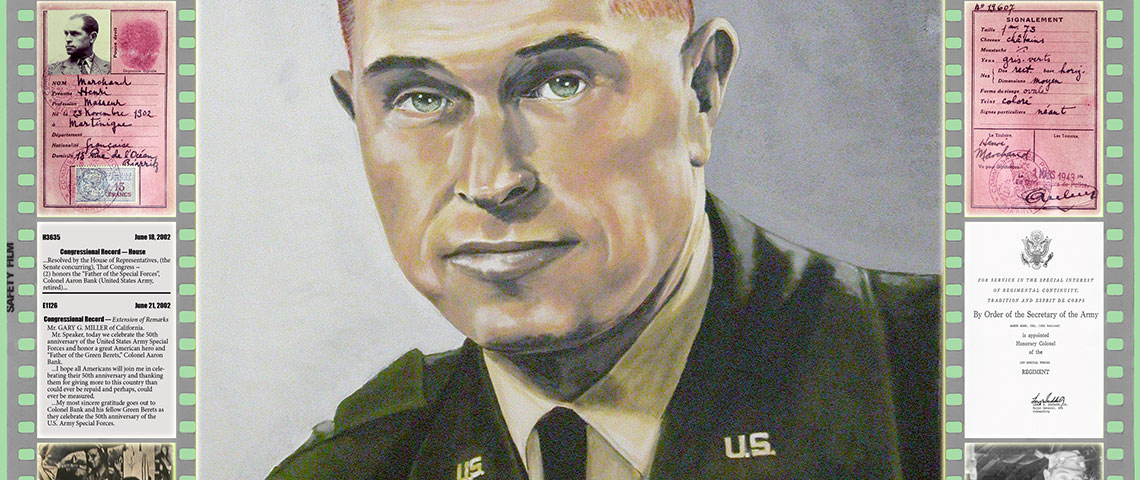DOWNLOAD
When Colonel Aaron Bank, U.S. Army (retired) passed away in April 2004 at the age of 101, he left behind a legacy embodied by the Army Special Forces, one of the elite units in the United States military. Popularly known as the “Father of Special Forces,” Bank was instrumental in the development of the Special Forces program and was the first commander of the 10th Special Forces Group, the first Special Forces group in the Army.
Born in November 1902, Bank spent much of his youth traveling in Europe. Fluent in French and to a lesser extent in German, Bank lived and worked in Europe including a stint as the head lifeguard at a posh resort in Biarritz, France. He joined the Army in 1939, but as an older officer he was precluded from an active combat role and he was assigned as a training officer to a railroad battalion at Fort Polk, Louisiana, when the United States entered the war. Happening upon a notice for volunteers with language capability, he volunteered for the Office of Strategic Services and was assigned to the Special Operations branch. He soon found himself in England leading a three-man Jedburgh Team behind the lines in occupied France after D-Day.1
Team Packard, composed of Bank, French Lieutenant Henri Denis, and Jean, a French radio operator, deployed from Algiers and parachuted into France on the night of 31 July 1944 into the Lazare Department in the Rhone Valley. Operating behind the German lines in the path of General Alexander M. Patch’s advancing 7th Army, Bank and his team juggled support for two resistance factions, the Gaullist Forces Francaises de l’Intérieur and Communist Francs-Tieurs et Partisans as the two groups harassed the retreating Germans and battled each other for supremacy in the liberated towns the Germans evacuated. For six weeks, Bank and his team rotated between the various partisan groups training them in guerilla warfare. By November 1944, Team Packard was disbanded along with the other Jedburgh teams in France.2

Bank found himself back in London as the leader of Operation Iron Cross, a mission to insert five Americans and nearly two hundred ex-German Army volunteers into the Inn Valley in Austria to create havoc in the German rear and ultimately attempt to capture Adolph Hitler and other high-ranking Nazi’s from what was thought to be their redoubt in Berchtesgarden. Bank trained his team to a razor’s edge only to have the mission aborted in April 1945 when 7th Army rolled into Austria and Bavaria and the Third Reich collapsed. With the end of Iron Cross, Bank volunteered to join the Office of Strategic Services in the Far East and soon found himself in Kunming, China.3
Bank’s new missions included training a two-hundred man company of Vietnamese soldiers formerly in the French Army and with three French officers to lead them on a raid against an Army-level Japanese headquarters on the Red River near Hanoi. This mission was cancelled in July 1945 when it was determined that the Viet Minh would not allow the entrance of the French back into the country. He subsequently parachuted with a nine-man team into Laos to search for internees and prisoners of war and eventually made his way to Hanoi and accompanied Ho Chi Minh to Hue. In October 1945, the Office of Strategic Services was disbanded and all the teams recalled. Bank returned to the Regular Army at the end of the war.4
In 1951, Bank served as the executive officer of the 187th Regimental Combat Team in Korea. Promoted to Colonel, he was reassigned to the Army’s Psychological Warfare Staff in the Pentagon, under the direction of Brigadier General Robert A. McClure. Joined by Lieutenant Colonel Russell Volckmann and Colonel Wendell Fertig, World War II veterans who led guerilla units in the Philippines, Bank formulated the doctrine and principles that became the foundation of today’s Special Forces.
The 1951 deactivation of the Army Ranger companies for Korea freed up 2,300 personnel spaces. Bank recruited former OSS, paratroopers, Rangers, and foreign national in the U.S. Army under the Lodge Act to fill the ranks of the new Special Forces unit. Moving to Fort Bragg, North Carolina, Bank prepared the training plan and developed the Table of Organization and Equipment for what would become the Operational Detachments A,B, and C and the SF Group Headquarters.5
On 19 June 1952, Aaron Bank took command of the 10th Special Forces Group (A) at Fort Bragg. In November the 10th deployed to Germany and established its headquarters at Flint Kaserne in Bad Tölz, leaving behind a cadre to form the 77th Special Forces Group. Bank commanded the 10th until late 1954 and then became the Seventh Army’s Chief of Plans and Operations. Colonel Bank retired from the Army in 1958.
Colonel Bank was the first honorary Colonel of the Special Forces Regiment, a position he held until his death in 2004. In 2002, be was recognized by Congressional Resolution 364 as the “Father of Special Forces.” The Special Operations Academic Facility at the John F. Kennedy Special Warfare Center and School is named in honor of Colonel Bank.6
